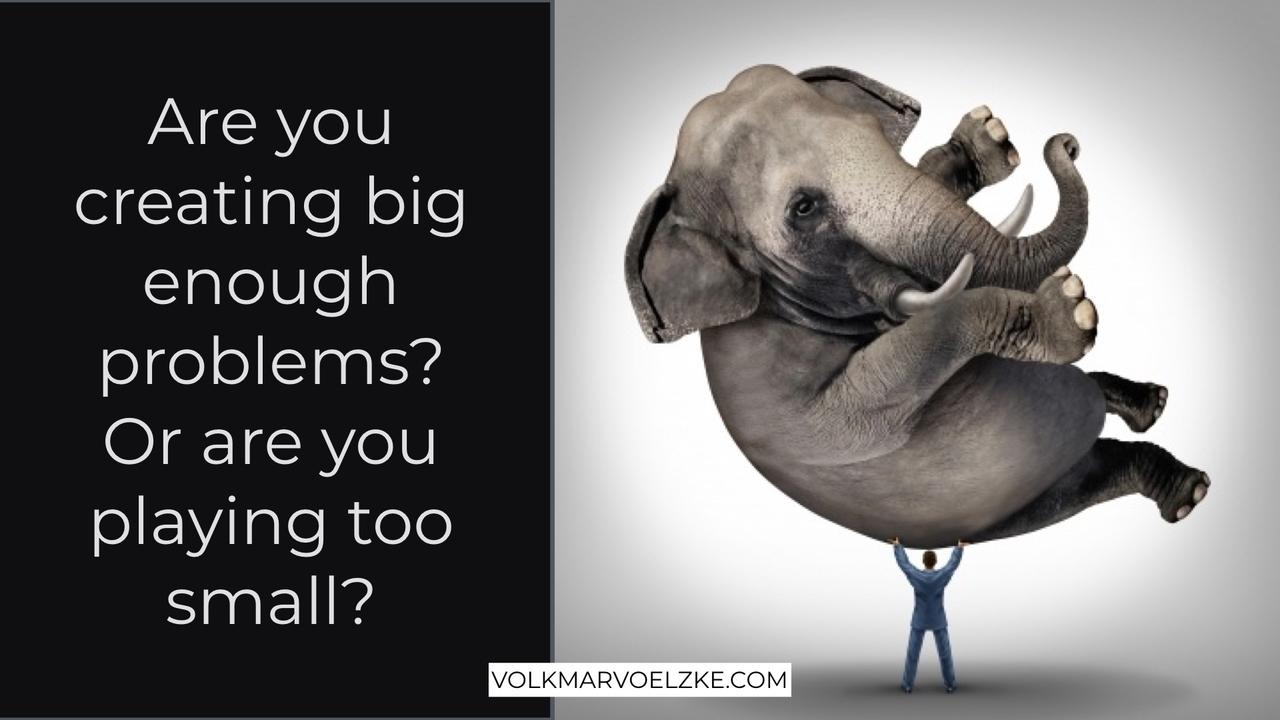Small and powerful

Small steps over time can produce huge results. I have already written elsewhere about the compounding effect.
This applies not only to our own actions but also to upheavals in the market. Only relatively few enormous changes come overnight. Often it takes years, sometimes decades (or even over 100 years, like an electric car).
The problem: we overlook the small daily changes that ultimately lead to huge upheavals. Our brain is poor at developing long-term predictions.
We see this wonderfully in European politics right now: the "big people's parties" have not seen (or want to see) the change taking place in society for decades: Away from lifelong employment in the same company towards "patchwork careers". Away from lifelong loyalty, towards day-to-day decisions. And so on.
We can like it or not: it remains a reality.
How can we deal with this creeping change? What should we as a company do to escape the fate of those who have not seen it coming?
Three ideas:
- Strategy. Make str ...
What do your people think about?

It is commonly said, “You will become what you think of most of the time.” This applies to any organization. The more people talk about “unsolvable” problems, the more unsolvable those problems become.
The more managers talk about tough competition from Asia or elsewhere, the more the staff will act as if the situation is hopeless. The more people think that the next meeting is a waste of time, the more likely it is that the meeting will be ineffective.
The root cause is the programming of our brain: we move in the direction we are facing. And we generate the reality we think of most.
This is why the assessment of any company’s difficulties is fairly easy for me as a consultant: most of the time, I just need to listen carefully to how people talk during the day. You as a leader can do the same: listen carefully to yourself and to your people. And then influence the thought patterns.
Here are five ideas:
- During a meeting, when people start discussing a problem, simply ask this q ...
Why you're struggling

There are concepts in psychology that, if taught in school and university, would make all the difference in people’s lives and careers. But nobody teaches them.
Only when we study the “old” masters of success psychology, such as Jim Rohn, Zig Ziglar, Darren Hardy, John Maxwell, and others, we find out about the power of these simple truths.
This is no “theoretical stuff” (as you might think), but precisely the difference between the most successful people and the rest.
One of these principles is this: you attract success by who you become, not by pursuing it. I was writing about this in earlier posts.
Today, I want to give you three concrete examples you can apply in your business immediately:
- If you want more sales, become a person that attracts people who want to spend money with you and your business. No matter what you sell, first, you sell yourself as a person. Are you somebody, who others want to leave large amounts of money with? Your question: who do I need to become ...
Only 3 seconds!
The next three seconds decide your life! Doesn’t that sound too dramatic? Well, there is some truth in it.
You can completely change your entire life within a few seconds. Also, you had already done this in the past: when you asked your partner perhaps the most important question. When you called the prospective buyer, who later became your best customer. Or, when you separated from a team member - for the good of both sides.
You can prepare every decision for a long time. Making the decision then takes seconds or even fractions of a second.
But, here's the most important thing: you can use the next three seconds to make a decision that will have a significant positive impact on your success. Alternatively, you can let these three seconds pass.
Examples for applying the 3-second rule:
- Take a deep breath and then call the ten people you've been trying to follow up for a long time.
- Take a deep breath and then finally sign up for the course that will take you massively forward in ...
Everything will be different tomorrow!
I'll tell you a secret: your whole life is just one big change. Nothing remains the same. Even not your body, as your cells are constantly renewing, just like your environment. What is not constantly renewing will die.
In other words: Change is the normal state. Stability is an illusion.
And yet we often pretend we can keep everything as it is. Where does that belief originate? We learn over years and decades - at school and work - that it is good to control the state of things.
Do you know what the most successful people do (as opposed to the average)? They control the change process instead of the current state.
The good news is that you can learn that process. But you have to 'get to grips' with your way of thinking.
Here is my micro-training program for you:
- Consciousness. Write down what has changed around you in the last 12 months, both small and big things. Often, we don't notice changes and think that everything stays the same. This is an illusion.
- Design. Write down w ...
How to eat an elephant
Maybe you know the comical question, "How do you eat an elephant?" The answer: "Bite by bite!"
The background is a very relevant one for changing behaviors and corporate cultures: Most changes never happen - even if you consider them important - because people never really start.
And by "start" I don't mean that you're attending a workshop or reading a book on the subject (although these can be important preparations), but that you're really changing something about yourself.
The order is always: awareness ➔ intent to change ➔ information ➔ execution ➔ perseverance.
Steps 1-3 can be seen quite often among individuals and in companies. Even step 4 sometimes still occurs. At step 5 we lost most of the people, despite our best intentions. The elephant mentioned at the beginning still stands tall.
So how can you overcome this obstacle? Here are three steps:
- Simple process. Simply define the steps you want to take on yourself. Then implement them, every day. Example: If you want to ...
Do you lean forward? Or are you losing control?
Today, I send you a video impulse, directly from the ski slopes of Tignes in the French Alps at an altitude of over 3000m.
Of course, I also included a message for leadership, which I had already shared a few years ago - with some resonance.
What is it about?
Every good skier knows that you have to do something counterintuitive to get down the slopes safely: You have to lean forward – the steeper and more difficult the slope the more.
Beginners, on the other hand, tend to lean backwards and wonder why they lose control.
And here's the question: How much do you lean forward in business? To make the analogy more concrete, here are three examples:
- Ambition. Do you set ambitious goals or are you satisfied with the situation as it is? Many of the leaders I see "lean back quite a bit" when it comes to ambition.
- Sales. Do you represent your products and services passionately and persuasively? Or do you tell yourself that the customer will come when he wants something? Only a few sale ...
Are you standing in the rain?

The other day I published a video on LinkedIn that attracted some attention and sympathy (watch it here).
The title is "Do you ever feel like standing in the rain?" It's about a myth I keep encountering, namely that success means a better and easier life.
Is that really the case? The answer: Yes, partly.
After all, success comes at a price (which everyone who wants to be successful in an unfamiliar field knows): The price is that you have to do profane and often hard work which has nothing to do with success directly.
Examples:
- As a top tennis player, you have to train serving again and again, even if it's not fun (and it almost never is).
- As a top seller, you have to generate new leads again and again, even if it's hard and ungrateful. And you rarely feel successful.
- As a top leader, you always have to deal with the profane worries of the team members and other unpleasant topics, even if you would rather do completely different things.
There are countless examples of these...
Create more problems!

If you don't have enough success, maybe you are not creating enough problems! You might find yourself rubbing your eyes in amazement: "Create more problems? We already have enough of them!”
Or: "Don't the problems prevent us from focusing on the essentials?
This is all correct, however: Too often people do not strive for the next level of success because they fear they will get even more problems as a result.
And that is exactly the point: You will always generate problems if you substantially change something. So you better have the mindset that creating problems is something positive.
In other words, the more problems you create, the more it becomes a sign you, your team or company are developing substantially.
Or do you think that Elon Musk, Richard Branson, Steve Jobs, Nelson Mandela and many others have pursued the path to success without experiencing problems? It will more than likely be the opposite!
So, the next time you are looking for the easiest way with the lowest co...
Who wants to win anyway?

I have just come back from a global leadership workshop for a medium-sized company in Vienna. Almost 40 leaders who participated went through one and a half days of intensive and successful training. The goal was: to create the basis for winning team leadership.
In these types of workshops, the question inevitably arises as to why and whether we want to win. Is winning good at all? And, will others not lose if we win too much?
The answer to these questions is simple: once you have put the participants in a playful competitive situation, everyone will absolutely want to win - virtually without exception.
What really makes us have doubts about winning is the fear of too much success, because success obliges. Success means responsibility. Success raises the bar.
If you want a team or company that will continue to operate successfully in the future (instead of drowning), there is no alternative to winning. Here are the three most important levers you need to use:
- More ambition. Most ...
